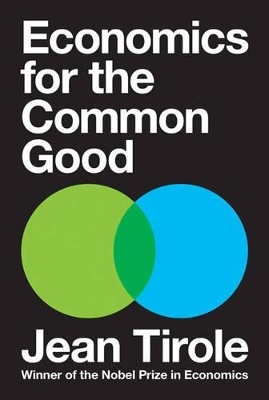
Economics for the Common Good
Princeton University Press (Verlag)
978-0-691-17516-4 (ISBN)
dismal science, is a positive force for the common good.
Economists are rewarded for writing technical papers in scholarly journals, not joining in public debates. But Tirole says we urgently need economists to engage with the many challenges facing society, helping to identify our key objectives and the tools needed to meet them.
To show how economics can help us realize the common good, Tirole shares his insights on a broad array of questions affecting our everyday lives and the future of our society, including global warming, unemployment, the post-2008 global financial order, the Euro crisis, the digital revolution, innovation, and the proper balance between the free market and regulation.
Providing a rich account of how economics can benefit everyone, Economics for the Common Good sets a new agenda for the role of economics in society.
Jean Tirole, the winner of the 2014 Nobel Prize in Economics, has been described as one of the most influential economists of our time. He is chairman of the Toulouse School of Economics and of the Institute for Advanced Study in Toulouse and a visiting professor at the Massachusetts Institute of Technology. His many books include The Theory of Corporate Finance and Financial Crises, Liquidity, and the International Monetary System (both Princeton).
Acknowledgments xiIntroduction Whatever Happened to the Common Good? 1Itinerary 5The Relationship between Society and Economics 7The Economist's Profession 8Institutions 10A Window on Our World 11The Common Thread 12I Economics And Society1 Do You Like Economics? 17What Prevents Our Understanding Economics 17The Market and Other Ways of Managing Scarcity 24How to Make Economics Better Understood 292 The Moral Limits of the Market 33The Moral Limits of the Market or Market Failure? 36The Noncommercial and the Sacred 40The Market, a Threat to Social Cohesion? 47Inequality 50II The Economist's Profession3 The Economist in Civil Society 65The Economist as Public Intellectual 66The Pitfalls of Involvement in Society 70A Few Safeguards for an Essential Relationship 76From Theory to Economic Policy 784 The Everyday Life of a Researcher 80The Interplay between Theory and Empirical Evidence 80The Microcosm of Academic Economics 91Economists: Foxes or Hedgehogs? 101The Role of Mathematics 104Game Theory and Information Theory 109An Economist at Work: Methodological Contributions 1185 Economics on the Move 122An Agent Who Is Not Always Rational: Homo psychologicus 123Homo socialis 137Homo incitatus: The Counterproductive Effects of Rewards 141Homo juridicus: Law and Social Norms 147More Unexpected Lines of Inquiry 149III An Institutional Framework For The Economy6 Toward a Modern State 155The Market Has Many Defects That Must Be Corrected 157The Complementarity between the Market and the State and the Foundations of Liberalism 160Politicians or Technocrats? 163Reforming the State: The Example of France 1697 The Governance and Social Responsibility of Business 174Many Possible Organizations ... but Few Are Chosen 175And What Is Business's Social Responsibility? 185IV The Great Macroeconomic Challenges8 The Climate Challenge 195What Is at Stake in Climate Change? 195Reasons for the Standstill 199Negotiations That Fall Short of the Stakes Involved 206Making Everyone Accountable for GHG Emissions 213Inequality and the Pricing of Carbon 222The Credibility of an International Agreement 226In Conclusion: Putting Negotiations Back on Track 2289 Labor Market Challenges 231The Labor Market in France 233An Economic Analysis of Labor Contracts 242Perverse Institutional Incentives 245What Can Reform Achieve and How Can It Be Implemented Successfully? 251The Other Great Debates about Employment 255The Urgency 26110 Europe at the Crossroads 265The European Project: From Hope to Doubt 265The Origins of the Euro Crisis 267Greece: Much Bitterness on Both Sides 282What Options Do the EU and the Eurozone Have Today? 28911 What Use Is Finance? 296What Use Is Finance? 296How to Transform Useful Products into Toxic Products 298Are Markets Efficient? 306Why Regulate in Fact? 32112 The Financial Crisis of 2008 326The Financial Crisis 327The New Postcrisis Environment 335Who Is to Blame? Economists and the Prevention of Crises 350V The Industrial Challenge13 Competition Policy and Industrial Policy 355What Is the Purpose of Competition? 357Where Does Industrial Policy Fit In? 36514 How Digitization Is Changing Everything 378Platforms: Guardians of the Digital Economy 379Two-Sided Markets 382A Different Business Model: Platforms as Regulators 389The Challenges Two-Sided Markets Pose for Competition Policy 39215 Digital Economies: The Challenges for Society 401Trust 402Who Owns Data? 405Health Care and Risk 408The New Forms of Employment in the Twenty-First Century 414The Digital Economy and Employment 423The Tax System 42716 Innovation and Intellectual Property 430The Imperative of Innovation 430Intellectual Property 431Managing Royalty Stacking 435The Institutions of Innovation 443Cooperative Development and Open Source Software 447And Many Other Debates ... 45317 Sector Regulation 455What's at Stake 455A Fourfold Reform and Its Rationale 456Incentive Regulation 460Prices of Regulated Companies 466Regulation of Access to the Network 471Competition and Universal Service 478Epilogue 481Notes 485Index 551
| Erscheinungsdatum | 31.10.2017 |
|---|---|
| Übersetzer | Steven Rendall, Keith Tribe |
| Zusatzinfo | 21 line illus. 5 tables. |
| Verlagsort | New Jersey |
| Sprache | englisch |
| Maße | 152 x 229 mm |
| Gewicht | 1077 g |
| Themenwelt | Geschichte ► Teilgebiete der Geschichte ► Wirtschaftsgeschichte |
| Wirtschaft ► Allgemeines / Lexika | |
| Wirtschaft ► Volkswirtschaftslehre | |
| ISBN-10 | 0-691-17516-0 / 0691175160 |
| ISBN-13 | 978-0-691-17516-4 / 9780691175164 |
| Zustand | Neuware |
| Informationen gemäß Produktsicherheitsverordnung (GPSR) | |
| Haben Sie eine Frage zum Produkt? |
aus dem Bereich


